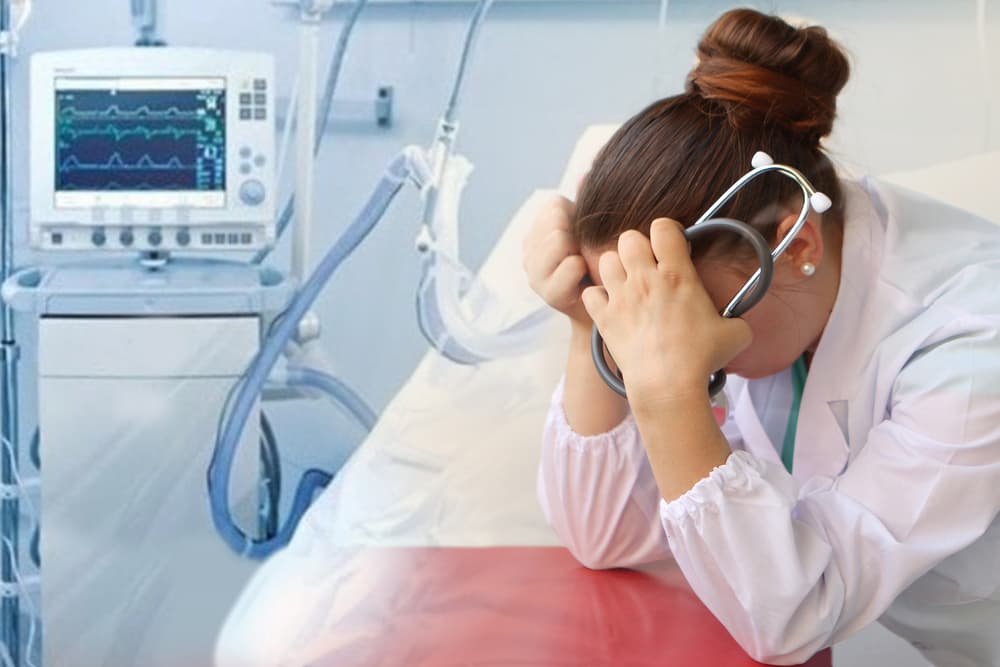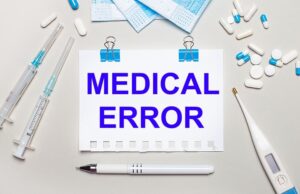These Are the Most Common Medical Errors
Gregg Hollander | July 3, 2024 | Medical Malpractice

When healthcare providers, including doctors, nurses, medical technicians, and pharmacists, make mistakes, serious health complications can occur. If you or someone you love suffered an injury or illness because of a medical error, you may be eligible to file a medical malpractice claim or lawsuit. An experienced medical malpractice attorney can guide you through the process and pursue the compensation you deserve to recover for your losses.
Types of Medical Mistakes
Medical mistakes, also known as medical errors, can occur at various stages of patient care and can have serious consequences. Here are some of the most common medical mistakes that healthcare providers and medical facilities make:
- Misdiagnosis or Delayed Diagnosis – One of the most frequent medical errors is the incorrect or delayed diagnosis of a condition. This can lead to improper treatment, worsening of the condition, or even death. Misdiagnosis can result from a variety of factors, including inadequate patient history, misinterpretation of diagnostic tests, or failure to recognize symptoms.
- Medication Errors – These include prescribing the wrong medication, incorrect dosage, or administering a drug to the wrong patient. Medication errors can occur due to illegible handwriting, confusion between drugs with similar names, and lack of knowledge about a patient’s allergies or existing medications.
- Surgical Errors – Mistakes during surgery can range from wrong-site surgery (operating on the wrong part of the body) to leaving surgical instruments inside the patient’s body. Surgical errors often arise from poor communication among the surgical team, fatigue, and failure to follow standard protocols.
- Infections Acquired in Hospitals – Hospital-acquired infections (HAIs) are infections patients get while receiving treatment for other conditions. These infections can result from bacteria, viruses, or fungi and are often linked to unsanitary conditions, improper hand hygiene, or the use of contaminated equipment.
- Falls and Injuries – Patients – especially the elderly or those with mobility issues – are at risk of falls while in hospitals or care facilities. These falls can result in fractures, head injuries, and other serious conditions. Often, these incidents happen due to insufficient staffing, inadequate monitoring, or lack of proper safety measures.
- Communication Failures – Effective communication among healthcare providers and between providers and patients is crucial. Miscommunication can lead to errors in patient care. For example, incomplete patient information transfer during shift changes or misunderstanding a physician’s instructions can result in critical mistakes.
- Errors in Patient Identification – Ensuring the correct identification of patients is fundamental to providing safe care. Mistakes in patient identification can lead to wrong treatments, tests, or procedures. Such errors often stem from inadequate verification processes and failure to use identification bands properly.
Individuals and Facilities Who Can Be Responsible for Medical Errors
Medical mistakes and errors can have serious consequences for patients, and responsibility for these errors can fall on a variety of individuals and entities within the healthcare system. Here’s a breakdown of who can be responsible:

- Doctors and Surgeons – Physicians, including specialists and surgeons, are often at the forefront of patient care. They can be responsible for errors such as misdiagnosis, improper treatment, surgical mistakes, and medication errors. These mistakes can result from factors like fatigue, lack of knowledge, inadequate patient history, or failure to follow standard procedures.
- Nurses – Nurses play a critical role in patient care, from administering medications to monitoring patients’ conditions. Nursing errors can include incorrect medication administration, failing to recognize and act on changes in a patient’s condition, and mistakes in following doctors’ orders. Such errors can stem from high workloads, long shifts, and miscommunication.
- Pharmacists – Pharmacists are responsible for dispensing medications and ensuring that they are given correctly. They can make mistakes such as providing the wrong drug or incorrect dosage, which can occur due to misinterpretation of prescriptions or confusion between similar-sounding drug names.
- Medical Technicians – These professionals perform diagnostic tests (such as X-rays and MRIs) and procedures. Errors can occur if technicians misinterpret test results, use equipment improperly, or fail to follow proper protocols. These mistakes can lead to incorrect diagnoses and inappropriate treatments.
- Healthcare Facilities – Hospitals, clinics, and other medical facilities can also bear responsibility for medical errors. Poorly maintained equipment, inadequate staffing, lack of proper hygiene practices, and insufficient training can all contribute to mistakes. Administrative errors, such as mishandling patient records or failing to communicate critical information, are also significant factors.
- Administration and Support Staff – Administrative and support staff are responsible for managing patient records, scheduling appointments, and ensuring effective communication between departments. Errors at this level can include incorrect data entry, lost records, and scheduling mistakes, all of which can affect patient care.
- Systemic Issues – Sometimes, the responsibility for medical errors can be traced to broader systemic issues within the healthcare system. These include lack of standardization, inadequate training programs, insufficient communication systems, and poor organizational culture. Addressing these systemic problems requires coordinated efforts to improve healthcare practices, policies, and technologies.
Filing a Medical Malpractice Claim for a Medical Error
Filing a medical malpractice claim due to a medical error is a complicated process that involves several steps. Here’s a general outline of the procedure:

- Seek Medical Records – The first step is to obtain all relevant medical records. These records will provide detailed information about the treatment received and help to establish what went wrong. They are essential for proving that a medical error occurred.
- Consult with an Experienced Attorney – It’s crucial to consult with a lawyer who regularly handles medical malpractice cases. They can assess the case, determine if there is a valid claim, and guide you through the legal process. Medical malpractice laws are complicated, and an experienced attorney can navigate these complexities for you.
- Review by a Medical Expert – Before filing the claim, a qualified medical expert typically needs to review the case. This expert will examine the medical records and provide an opinion on whether the standard of care was breached. This step is often required to prove that the medical error directly caused harm to the patient.
- Filing the Complaint – If the medical expert supports the claim, the attorney will file a legal complaint in court. The complaint outlines the details of the case, including the medical error, the harm caused, and the damages being sought. The healthcare provider or facility will then be formally notified of the lawsuit.
- Discovery Phase – After filing the complaint, both parties enter the discovery phase. During this period, both sides gather evidence through depositions, interrogatories, and document requests. This phase allows both the injured patient (the plaintiff) and the medical provider/facility (the defendant) to build their respective cases by obtaining all of the necessary information.
- Settlement Negotiations – Often, the parties will attempt to settle the case out of court. Settlement negotiations involve discussions between the plaintiff’s and defendant’s legal teams to reach an agreement on compensation. If a settlement is reached, the case is resolved without going to trial.
- Trial – If a settlement cannot be reached, the case goes to trial. Both sides present their arguments, evidence, and witnesses before a judge or jury. The judge or jury then decides whether malpractice occurred and, if so, determines the amount of compensation to be awarded.
- Appeal – If either party is dissatisfied with the trial’s outcome, they may choose to appeal the decision. The appeals process involves a higher court reviewing the case for legal errors that may have affected the verdict.
Navigating a medical malpractice claim requires diligence and a thorough understanding of legal procedures to seek justice and compensation for the harm resulting from medical errors.
Deciding Whether to Settle or Litigate a Medical Malpractice Case
Deciding whether to settle or litigate a medical malpractice case stemming from a medical error is a critical decision. Each option has its own set of advantages and disadvantages, and the choice depends upon various factors.
Settling the Case:
Settling a medical malpractice case means reaching an agreement between the plaintiff and the defendant without going to trial. Here are some benefits of settling:
- Speed and Certainty – Settlements are typically faster than trials. They can provide quicker compensation, which can be crucial for covering medical bills and other expenses. Settling also offers a certain outcome, as both parties agree to the terms.
- Lower Costs – Expert fees and court costs can be substantial. Settling a case generally incurs fewer expenses than taking it to trial.
- Less Stress – Trials can be stressful and emotionally taxing. Settling allows both parties to avoid the anxiety and strain of a courtroom battle.
However, there are also downsides to settling:
- Potentially Lower Compensation – Settlements can result in lower compensation than what may be awarded at trial. The plaintiff must weigh the certainty of a settlement against the possibility of a higher but uncertain trial award.
- No Admission of Fault – In many settlements, the defendant does not admit to any wrongdoing. This can be unsatisfying for plaintiffs seeking acknowledgment of the medical error.
Litigating the Case:
Litigating means taking the case to court, where a judge or jury will decide the outcome. Here are some reasons to consider litigation:
- Potential for Higher Compensation – Trials can result in higher compensation if the plaintiff wins. This is because the court can award damages for medical expenses, lost income, pain and suffering, and other losses.
- Public Accountability – A trial can hold the defendant publicly accountable for the medical error. This can be important for plaintiffs seeking justice and changes in medical practices.
However, litigation also has its drawbacks:
- Time-Consuming – Trials can take months or even years to resolve. This prolonged process can delay financial relief and prolong emotional distress.
- High Costs – The costs associated with a trial can be significant, including expert witness fees and other legal expenses.
- Uncertain Outcome – There is no guarantee of winning at trial. The outcome is uncertain, and the plaintiff risks receiving no compensation if they lose the case.
Deciding whether to settle or litigate requires careful consideration of these factors, often with the guidance of a knowledgeable medical malpractice attorney. The decision ultimately depends on the specific circumstances of the case and the plaintiff’s priorities.
Recovering Compensation for a Medical Error
When a medical error occurs and a patient suffers harm, the patient may be entitled to various types of compensation. This compensation is intended to cover the losses and damages resulting from the error. Here are the main types of compensation that individuals may recover:

- Medical Expenses – This type of compensation covers the cost of medical care required due to the error. It includes expenses for hospital stays, surgeries, doctor visits, medications, rehabilitation, physical therapy, and any future medical treatments that may be necessary.
- Lost Income – If the medical error causes the patient to miss work, compensation can cover the income lost during this period. This includes the time taken off for recovery, medical appointments, and any additional time off work due to ongoing medical issues.
- Loss of Earning Capacity – In cases where the medical error results in a long-term or permanent disability, the patient may be unable to return to their previous job at all. Compensation for loss of earning capacity accounts for the future income the patient would have earned but for the medical error and resulting illness/injury.
- Pain and Suffering – This compensation is for the physical pain and emotional distress resulting from the medical error. Pain and suffering can be challenging to quantify, but it aims to provide relief for the enduring discomfort and psychological effects that the patient experiences.
- Loss of Consortium – This type of compensation is awarded to family members of the patient – typically the spouse. It covers the loss of companionship, affection, and support due to the patient’s injury. It also acknowledges the effect of the injury on the patient’s relationships and family life.
- Disability and Disfigurement – If the medical error leads to a permanent disability or disfigurement, compensation may be awarded to address these specific damages. This includes compensation for the effect on the patient’s quality of life and their ability to perform everyday activities.
- Punitive Damages – In cases where the medical error was a result of gross negligence or intentional misconduct, the court may award punitive damages. These are meant to punish the responsible party and deter similar behavior in the future. Punitive damages are not always awarded and depend upon the severity and nature of the negligence.
- Out-of-Pocket Expenses – These are additional expenses the patient incurs due to the medical error, such as transportation costs to medical appointments, home modifications for disability accommodations, and hiring help for daily activities.
Recovering compensation for a medical error requires proving the extent of the damages and the connection to the medical error. An experienced medical malpractice attorney can help injured patients navigate this process and ensure that they receive the compensation they deserve for their losses and suffering.
Contact an Experienced Medical Malpractice Lawyer in Your Area Today
If you suffered an injury or illness due to medical negligence, you need to retain a knowledgeable personal injury lawyer to represent you as quickly as possible. Your lawyer can thoroughly investigate the circumstances, go over your options with you, and pursue the compensation you need for your medical complications.
